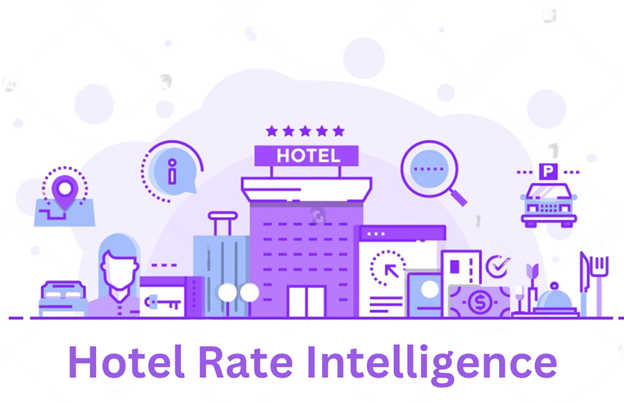How to Stay Ahead of Competitors Using Hotel Rate Intelligence
- 1 What is Hotel Rate Intelligence?
- 2 Why is it Important for Hotels?
- 3 Importance of Competitive Positioning in the Market
- 3.1 (a) Maximized revenue during peak seasons
- 3.2 (b)The ability to attract the right guest demographic with attractive pricing.
- 4 How to Use Hotel Rate Intelligence
- 4.1 1. Track Your Competitors’ Rates
- 4.2 2. Analyze Market Trends
- 4.3 3. Set Competitive Rates
- 4.4 4. Use Rate Intelligence to Optimize Your Marketing
- 4.5 5. Be Flexible with Your Rates
- 5 What are the Tools You Can Use For Hotel Rate Intelligence?
- 6 Conclusion
Ever wondered how some hotels consistently nail their pricing strategy and stay full even during off-peak times? It’s not luck or magic—it’s data.
To achieve the same or even better you need to utilize Hotel Rate Intelligence. It’s the unsung hero that’s leveling up the hospitality game.
So, wanna know how you can use hotel rate intelligence to get ahead of your competitors?
Get ready to explore!
What is Hotel Rate Intelligence?

Think of hotel rate intelligence as your hotel’s pricing crystal ball.
It’s a comprehensive set of data and tools that provides insights into market demand, competitor prices, and guest expectations, allowing you to set the right price at the right time for the right guest.
Why is it Important for Hotels?
Imagine driving a car with a blindfold on. Sounds risky, right?
In the same vein, running a hotel without rate intelligence is like venturing into unknown territory without a map. By tapping into this resource, you ensure the right pricing for your hotel rooms.
Now, the question is, why is it important to position competitive pricing? We have got you covered, check out further.
Importance of Competitive Positioning in the Market
In today’s bustling hotel market, opportunities are popping up left and right.
But, guess what? So is competition.
To not just survive but thrive, offering competitive pricing to your guests is non-negotiable.
(a) Maximized revenue during peak seasons
The peak season? That’s your golden hour. The trick? Strategic pricing. By understanding your market dynamics and guest demands, you’re not just riding the wave; you’re leading the charge. In turn? Maximized revenue.
(b)The ability to attract the right guest demographic with attractive pricing.
Who do you want walking through your doors? The high-rollers? The budget-conscious families? Your pricing isn’t just a number; it’s an invitation. Tailor it right, and you’ll magnetize the perfect demographic.
How to Use Hotel Rate Intelligence
By using the right hotel rate intelligence tools you can dissect the competition, pinpoint your positioning, and evolve on the fly. Knowledge is power, and in the hotel game, it’s the ticket to the top.
1. Track Your Competitors’ Rates
Monitoring competitor rates isn’t about being sneaky; it’s about staying informed. By having an understanding of what others in your vicinity charge, you can make informed decisions on your own pricing strategy.
And here’s where the magic of hotel price comparison APIs comes into play. This tool lets you automatically track and compare rates from various hotels in real-time. It’s like having a 24/7 spy in the world of hotel pricing!
2. Analyze Market Trends
Keep an eye on local events, holidays, and peak travel seasons. By understanding the demand flow, you can adjust your rates accordingly to get the most out of high-demand periods.
3. Set Competitive Rates
Based on the data you’ve gathered, determine a price point that offers value to your guests while ensuring profitability for your establishment. Remember, it’s not always about being the cheapest; it’s about offering the best value.
4. Use Rate Intelligence to Optimize Your Marketing
Tailor your promotions and packages based on rate intelligence insights. For instance, if you notice a dip in demand, consider offering special packages or discounts to attract bookings.
5. Be Flexible with Your Rates
The hotel industry is dynamic. As such, being rigid with your rates can cost you in the long run. Adjust your rates based on real-time data and market shifts to remain competitive.
What are the Tools You Can Use For Hotel Rate Intelligence?
Want the secret sauce to perfecting your pricing strategy? It’s all about wielding the right tools. And guess what? We’ve rounded up a few gems just for you.”
HotelAPI.co: Think of this as your trusty sidekick, offering real-time price data from a whopping 200+ online travel agencies. React in a snap to market shifts and even get a glimpse into historical pricing.
Rate Insight: It’s like having a bird’s-eye view of the market. Sleek dashboards, competitor rate-tracking, and a pulse on market demand. Pure gold.
RateTiger: This gem is more than just rate intelligence. Imagine it as your Swiss Army knife, offering distribution solutions alongside its real-time data.
OTA Insight: The Sherlock Holmes of hotel tools. Get real-time alerts, keep an eagle eye on rate parity, and even predict demand. For those who love to stay two steps ahead.
RateGain: It’s rate intelligence with a sprinkle of AI magic. Dive deep into billions of data points and emerge with insights that make your pricing game unbeatable.
RevPar Guru: Dynamic pricing is the future, and this tool is leading the charge. Algorithms adjust your room rates in real-time, ensuring you’re always in the sweet spot.
Alright, here’s the lowdown: With tools like these in your arsenal, you’re not just boosting occupancy – you’re skyrocketing profitability. The hotel game is ever-evolving. By staying on top of market trends and adjusting on the fly, you’re ensuring your deals are the talk of the town. Ready to turn those vacancy signs off for good?
Conclusion
Staying ahead in the hotel game isn’t just about plush linens and gourmet breakfasts (though those are great!). In today’s digital age, data is king. And with hotel rate intelligence, you’re armed with actionable insights to keep you a step ahead of the competition.
So, whether you’re a boutique bed and breakfast or a sprawling resort, tapping into rate intelligence is no longer just a ‘nice-to-have’ but a necessity.

















